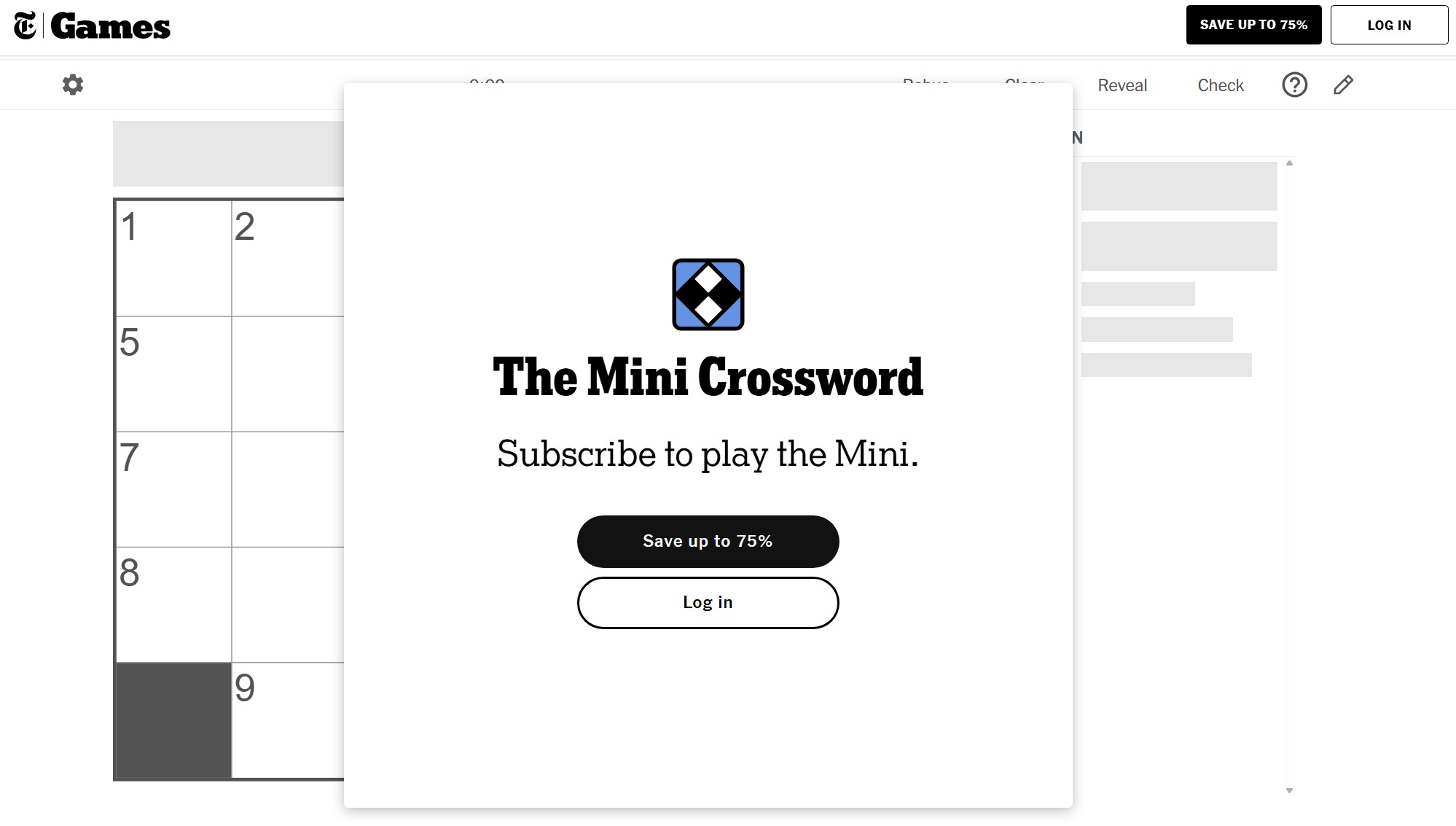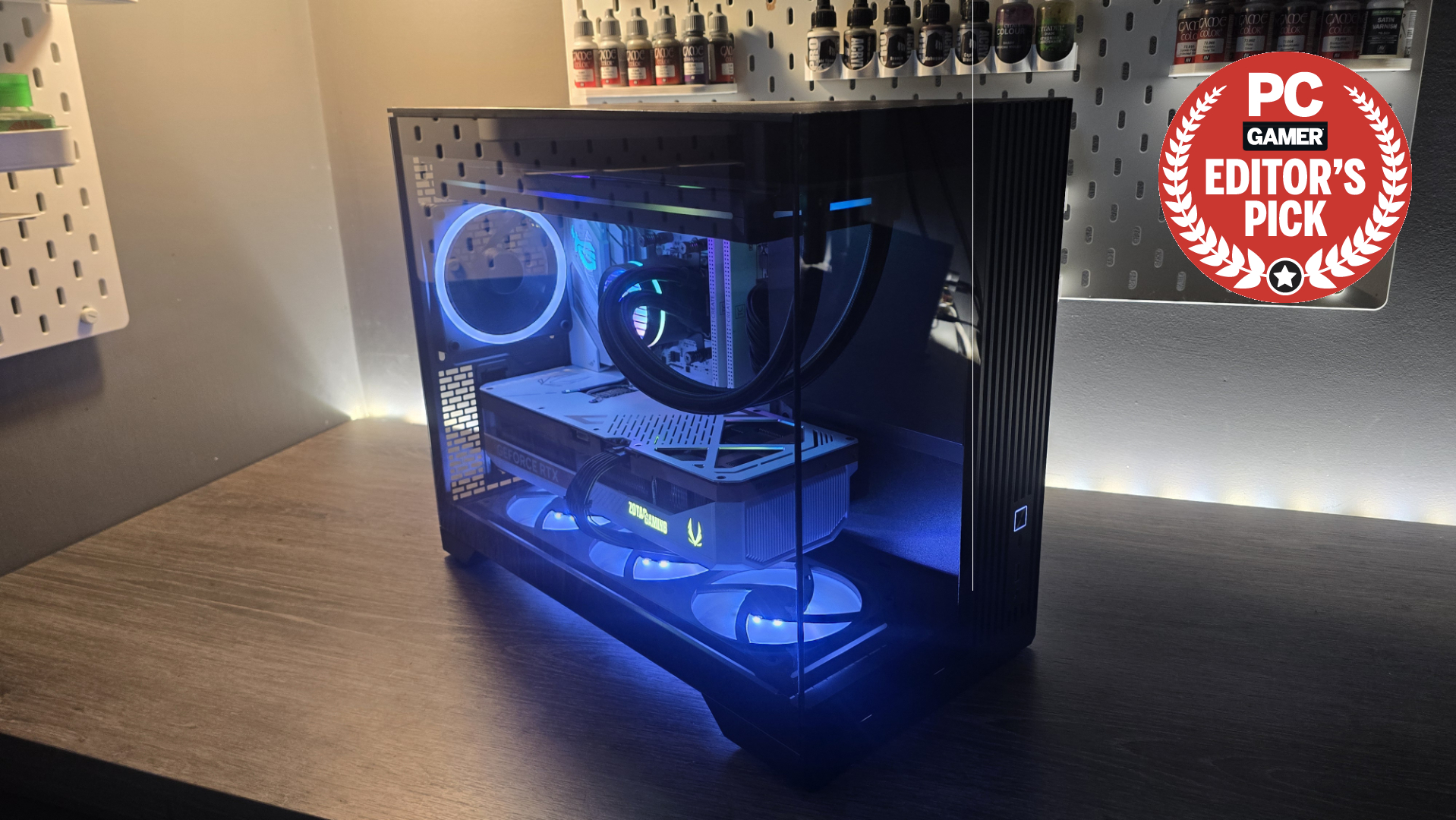Crossword lovers in mourning as the New York Times commits its latest unspeakable act: Paywalling the Mini puzzle
The popular daily puzzle is now seemingly an exclusive for NYT Games subscribers.

Keep up to date with the most important stories and the best deals, as picked by the PC Gamer team.
You are now subscribed
Your newsletter sign-up was successful
Want to add more newsletters?
There's a tweet from early 2021 I think about more often than I should think about any tweet not written by dril, because it really does feel like it speaks to The Times We're Living In: "Trying to explain to my parents (very gently) that basically nobody under 40 right now expects good things to happen ever again." Overly broad? Sure: For one thing, this gloomy outlook couldn't account for the invention of beloved puzzle game Wordle just seven months later, which has made many people happy for up to several seconds at a time.
But on a long enough timeline I'd say it proves out, because the endless march of enshittification guaranteed the New York Times would buy Wordle and eventually slap ads on it, and slowly leverage its growing empire of pleasant daily puzzles into a multi-million dollar profit scheme. We arrive now to the horrible present: The Mini crossword, most frivolous and innocent of all the NYT Games puzzles, is now, without warning, stuck behind the subscriber paywall.
"Miserable buggers. It was tiny and not particularly great, but it was something in this godforsaken capitalist hellscape," mourns one soulful member of r/crosswords, where Redditors have been coming to terms with the sudden change.
The Mini is, indeed, tiny and not particularly great. As a crossword puzzle its defining feature is its simplicity, challenging you to clear its miniature grid in a matter of seconds rather than minutes or hours. But NYT Games has in recent years found great success and millions of dollars in profit from these sorts of snackish puzzles, many of them free to play. At least for now. With time and innovation, even the most frivolous moments of our daily routines can be effectively monetized.
The stages of grief at this dawning revelation are all laid bare in this most human of Reddit reaction threads:
DENIAL: "My guess is that’s it’s an error. In the app it’s still listed under the free games section." On a desktop browser, a pop-up forces you to subscribe (currently with a button proclaiming you can "Save up to 75%"); using the Internet Archive's Wayback Machine, I confirmed that a few weeks ago, the pop-up included another button to "Play without an account. Upon updating the NYT Games Android app, the previously free daily mini puzzle appeared with a subscriber lock on its icon.
ANGER: "Gouge! Gouge! Gouge! Gouge! Gouge! Gouge! Gouge! Gouge! Gouge! Gouge! Gouge! Gouge! Gouge! Gouge! Gouge! Gouge! Gouge! Gouge! Gouge! Gouge! Gouge! Gouge! Gouge! Gouge!"
Keep up to date with the most important stories and the best deals, as picked by the PC Gamer team.
BARGAINING: "We should all write a letter to the editor of the nyt. letters@nytimes.com. If the cracker barrel can get their sign back then we can get our free mini back."
DEPRESSION: "I hate it here. Why can’t we have nice things"
ACCEPTANCE: "I bit the bullet and subscribed. Not just for the mini, but for other features they include with other games. They’re having a sale right now."
If you receive your news from any source but The New York Times, you may rightly view this as a trifling offense in its recent history of journalism that ranges from embarrassing to gross to, uh, actively heinous. And you might further think, well, I could probably go play some daily puzzles over at Merriam-Webster. The dictionary seems pretty cool and doesn't pay any opinion writers to chat about eugenics. That's good thinking. Respectable. Can't argue with it.
But that 75% off offer isn't going to last forever, you know. And The Mini? Well, sure there are plenty of other crossword websites around, but that one's right there in your browser history. It's right there in the app. A guaranteed easy win. A daily affirmation that you are wise.
What's a few bucks, the New York Times whispers, to pretend for 48 seconds every day that good things can still happen?

Wes has been covering games and hardware for more than 10 years, first at tech sites like The Wirecutter and Tested before joining the PC Gamer team in 2014. Wes plays a little bit of everything, but he'll always jump at the chance to cover emulation and Japanese games.
When he's not obsessively optimizing and re-optimizing a tangle of conveyor belts in Satisfactory (it's really becoming a problem), he's probably playing a 20-year-old Final Fantasy or some opaque ASCII roguelike. With a focus on writing and editing features, he seeks out personal stories and in-depth histories from the corners of PC gaming and its niche communities. 50% pizza by volume (deep dish, to be specific).
You must confirm your public display name before commenting
Please logout and then login again, you will then be prompted to enter your display name.

